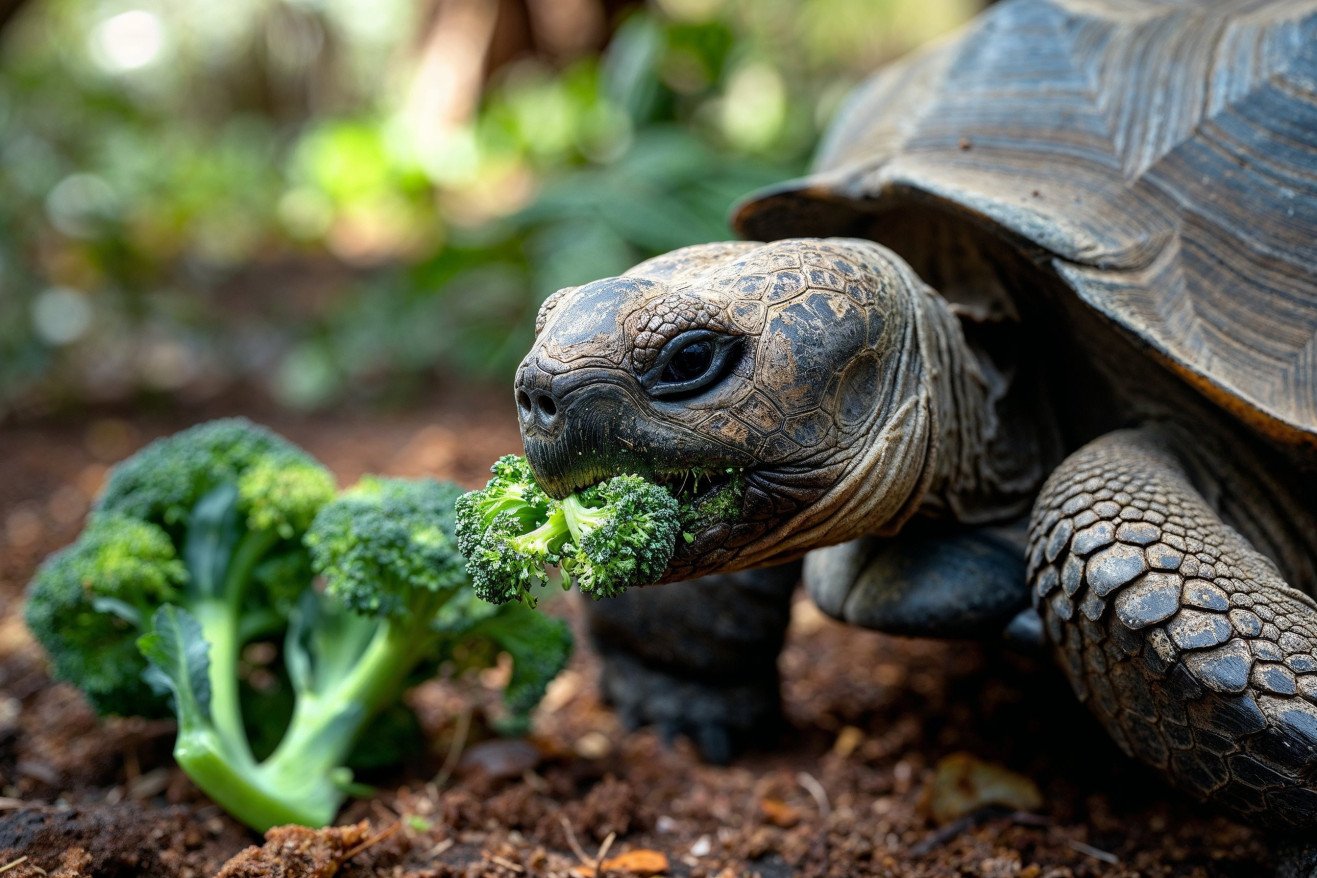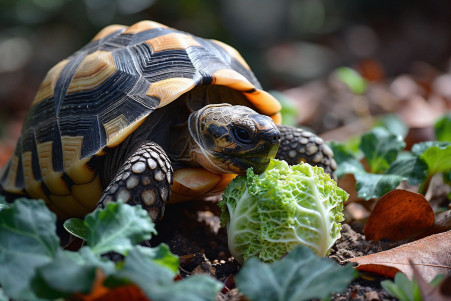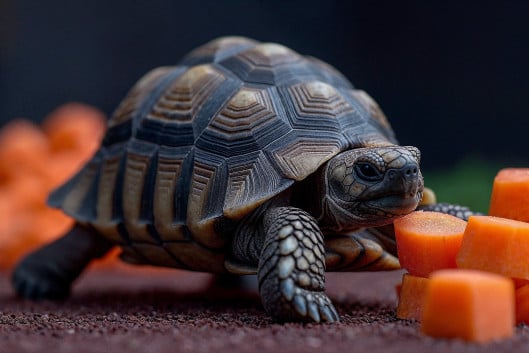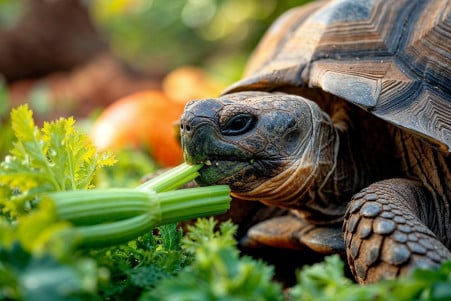Can Tortoises Eat Broccoli? Nutritional Benefits & Risks Explained
30 January 2024 • Updated 30 January 2024

It’s important to make sure that tortoises are getting a well-rounded diet, but does that mean that broccoli should be on the menu? While it should be fed in moderation, tortoises can eat broccoli as part of a balanced diet. Broccoli is a good source of vitamins A and C, but it also contains goitrogens, so it’s not something that should be fed to tortoises too often.
That said, it’s important to make sure that tortoises are getting a variety of vegetables to make sure that they are healthy and happy.
To determine whether or not broccoli is a good option for tortoises, this article takes a deep dive into a number of scientific studies and expert opinions. It looks at the nutritional breakdown of broccoli, the dietary needs of tortoises, and the impact of certain compounds like goitrogens and oxalic acid.
By combining information from herpetology, veterinary science, and nutrition research, this article aims to give a complete picture of how to incorporate broccoli into a tortoise’s diet in a way that is safe and healthy.
Can tortoises eat broccoli?
Broccoli: A Nutritional Powerhouse for Tortoises
Broccoli’s impressive nutritional profile makes it a great choice for your tortoise. According to Healthline, this green cruciferous vegetable is a great source of fiber, vitamin C, vitamin K, iron, and potassium. In fact, one cup of raw broccoli contains 2.3 grams of protein, which is important for muscle and shell development, and 2.2 grams of fiber, which is important for tortoise digestion.
Meanwhile, antioxidants like sulforaphane help protect cells from damage. As a result, a review in PMC explains that broccoli is a rich source of nutrients, including vitamins A and C, that help tortoises maintain healthy eyesight and immune systems. Plus, the calcium in broccoli is good for their shells and bones.
In addition, the fiber in broccoli can help keep your tortoise’s digestive system running smoothly and help them feel full, which can help prevent overeating, a common problem in pet tortoises. By understanding the importance of these nutrients in broccoli, we can understand how they fit into a well-rounded tortoise diet that prioritizes variety and balance.
Addressing Toxins: Goitrogens and Oxalic Acid in Tortoise Diets
The Merck Veterinary Manual explains that goitrogens are substances that interfere with the uptake of iodine by the thyroid gland, thereby inhibiting the production of thyroid hormones and potentially leading to goiter.
Cruciferous vegetables, such as broccoli, are a well-known example of goitrogenic foods. Meanwhile, the Big and Small Tortoise Rescue and Sanctuary explains that oxalic acid is a naturally occurring substance that binds to minerals like calcium, making them less available to the body.
While high levels of goitrogens and oxalic acid are worrisome because of their potential impact on thyroid function and mineral absorption, the research on their effects on tortoises is inconclusive. Reptiles Magazine explains that the goitrogenic effects of these substances can be reduced by cooking, which may mean that tortoises, who eat these vegetables raw, are at a lower risk.
Meanwhile, a study by Innis from 1994 points out that there are no documented cases of oxalate lithiasis in reptiles, which may indicate that tortoises have evolved to tolerate higher levels of these substances.
The question of whether tortoises have evolved to tolerate these substances in their diet is still up for debate. While the potential dangers of goitrogens and oxalic acid suggest that tortoises may not be well-adapted to consuming them, the fact that there are no documented cases of adverse effects in reptiles suggests that they may be a natural part of their diet.
This knowledge can help tortoise owners make informed decisions about what to feed their pets, ensuring that they get the nutrients they need to thrive.
Tortoise Feeding in the Wild
Tortoises are opportunistic feeders in the wild, and their diets change as they move through the different landscapes in their environment. They eat a variety of grasses, leafy greens, and flowers as they move through their surroundings.
For example, according to a fact sheet by the International Environment Library Consortium, desert tortoises eat desert annuals and can be picky eaters, especially when there is a lot of rain. They eat a variety of plants, and each plant has a different nutritional profile.
The tortoise digestive system is designed to process a high-fiber diet and is similar to other hindgut fermenters like rabbits and horses. This means that they can break down plant material and extract the nutrients they need from it. Galapagos Giant Tortoises eat over 60 different plant species, which shows how they can adapt to different foods to get the nutrients they need.
One important nutrient for tortoises is calcium, which is important for bone and shell health.
In a study by Walde et al., tortoises were observed seeking out calcium sources, often from natural sources like bones or mineral-rich soils.
This shows that tortoises have an instinct to find the nutrients they need. This is why it’s important for tortoise owners to make sure that their pet’s diet includes foods that are high in calcium, like broccoli, which is a good source when fed in moderation. Making sure that they get a balanced diet that includes these types of vegetables is important for their overall health, and it will help ensure that their diet is both natural and nutritionally complete.
How to Feed Broccoli to Tortoises
Because of the potential health risks associated with goitrogens and oxalic acid, broccoli should only make up about 3% of a tortoise’s diet. To avoid potential problems, it’s best to feed tortoises raw broccoli since cooking can reduce the nutritional content, and tortoises would eat their food raw in the wild.
It’s important to make sure that tortoises are eating a well-balanced diet. Broccoli can be fed once a week in small amounts with other vegetables. Tortoises can eat the florets, leaves, and stems of broccoli, but the stems should be fed in moderation because they can be hard to digest.
Conclusion: Can Tortoises Eat Broccoli?
In conclusion, this article has shown that tortoises can eat broccoli, but it should be done with caution. The nutritional value of broccoli, which is high in fiber, vitamins, and antioxidants, can be beneficial to tortoises. This means that it can be a good addition to their diet.
However, it’s important to make sure that the benefits of feeding broccoli to tortoises are weighed against the potential downsides of goitrogens, which can have a negative impact on thyroid function if they are consumed in large amounts.
As a result, it’s important to make sure that tortoises are eating a variety of vegetables to ensure that they are getting all of the nutrients that they need.
A diet that includes a variety of greens and flowers will help ensure that tortoises are healthy and will be more in line with their natural diet. Feeding them broccoli occasionally will help ensure that they are getting a variety of nutrients without overloading them on any one thing.
In short, it’s important to make sure that tortoises are being fed in a way that is healthy for them. By making sure that broccoli is fed to tortoises in moderation and that it is part of a diet that includes other vegetables and calcium-rich foods, tortoise owners can make sure that their pets are getting the nutrition that they need.
In the end, it’s important to make sure that tortoises are being fed in a way that will help them live long and healthy lives.


